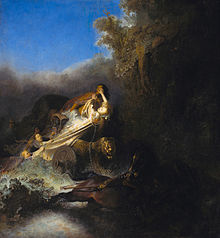Quick Facts
Biography
Claudius Claudianus, usually known in English as Claudian (/ˈklɔːdiən/; c. 370 – c. 404 AD), was a Latin poet associated with the court of the emperor Honorius at Mediolanum (Milan), and particularly with the general Stilicho. His work, written almost entirely in hexameters or elegiac couplets, falls into three main categories: poems for Honorius, poems for Stilicho, and mythological epic.
Life
Claudian was born in Alexandria. He arrived in Rome before 395, and made his mark with a eulogy of his two young patrons, Probinus and Olybrius, thereby becoming court poet. He wrote a number of panegyrics on the consulship of his patrons, praise poems for the deeds of Stilicho, and invectives directed at Stilicho's rivals in the Eastern court of Arcadius.
He was well rewarded for these efforts . He was granted the rank of vir illustris. The Roman senate honored him with a statue in the Roman Forum in 400. Stilicho's wife, Serena, secured a rich wife for him.
Since none of Claudian's poems record the achievements of Stilicho after 404, scholars assume Claudian died in that year.
As poet
Although a native speaker of Greek, Claudian is one of the best Latin poetry stylists of late antiquity. He is not usually ranked among the top tier of Latin poets, but his writing is elegant, he tells a story well, and his polemical passages occasionally attain an unmatchable level of entertaining vitriol. The literature of his time is generally characterized by a quality modern critics find specious, of which Claudian's work is not free, and some find him cold and unfeeling.
Claudian's poetry is a valuable historical source, though distorted by the conventions of panegyric. The historical or political poems connected with Stilicho have a manuscript tradition separate from the rest of his work, an indication that they were likely published as an independent collection, perhaps by Stilicho himself after Claudian's death.
His most important non-political work is an unfinished epic, De raptu Proserpinae ("The Abduction of Proserpina). The three extant books are believed to have been written in 395 and 397. In the 20th and early 21st centuries, Claudian has not been among the most popular Latin poets of antiquity, but the epic De raptu influenced painting and poetry for centuries afterwards.
Works

- Panegyricus dictus Probino et Olybrio consulibus
- De raptu Proserpinae (unfinished epic, 3 books completed)
- In Rufinum ("Against Rufinus")
- De Bello Gildonico ("On the Gildonic revolt")
- In Eutropium ("Against Eutropius")
- Fescennina / Epithalamium de Nuptiis Honorii Augusti
- Panegyricus de Tertio Consulatu Honorii Augusti
- Panegyricus de Quarto Consulatu Honorii Augusti
- Panegyricus de Consulatu Flavii Manlii Theodori
- De Consulatu Stilichonis
- Panegyricus de Sexto Consulatu Honorii Augusti
- De Bello Gothico ("On the Gothic War" of 402-403)
- Lesser poems: Phoenix, Epithalamium Palladio et Celerinae; de Magnete; de Crystallo cui aqua inerat
- Amy Golahny, "Rembrandt's Abduction of Proserpina," in The Age of Rembrandt: Studies in Seventeenth-Century Dutch Painting (Penn State Press, 1988), pp. 31ff.
Editions and translations
- Dewar, Michael, editor and translator. Claudian Panegyricus de Sexto Consulatu Honorii Augusti (Oxford Clarendon Press, 1996).
- Slavitt, David R., translator. Broken Columns: Two Roman Epic Fragments: The Achilleid of Publius Papinius Statius and The Rape of Proserpine of Claudius Claudianus, with an Afterword by David Konstan (Philadelphia: University of Pennsylvania Press, 1997).
- Baier, Thomas and Anne Friedrich, Claudianus. Der Raub der Proserpina, edition, translation and commentary (Darmstadt: WBG (Wissenschaftliche Buchgesellschaft), 2009), Edition Antike.
- English verse translations of Claudian online:
- A. Hawkin's translation (rhymed couplet) via Google Books.
- J. Strutt's translation (blank verse) via Internet Archive.
